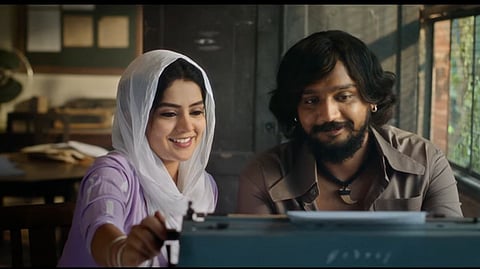Kaiva movie review: Jayathirtha's period actioner is a haphazard mess
Kaiva (Kannada)(2.5 / 5)
Graphic violence in movies is in vogue and when a benignant filmmaker like Jayathirtha Jayanna wishes to try his hand at it, there's all the proof you need. In Kaiva, the writer-director known for films like Olave Mandara, Bell Bottom, and Banaras goes after a brand of cinema that he is largely unfamiliar with. But despite his sincere attempt, he misses the mark by a considerable margin.
The setting in the new film is Thigalarapete of Bengaluru and the period is the 1980s, when the underworld was rampant in the city. Kaiva, the eponymous central character (played by Dhanveerah), is new to the scene and within days of his arrival, his eyes land on the very demure yet attractive Salma (Megha Shetty) during the iconic Karaga festival. Their respective faiths could be a concern for the bystander, but Jayathirtha does not view it that way. He offers absolutely no hassle to the couple to forge a relationship and for a good amount of time, everything is hunky-dory.
The issue is external and turns out, it's got to do with the world of crime that Thigaralapete is infamous for. Jayathirtha borrows several key real-life incidents from the '80s and models almost all his characters on actual gangsters and people from the time. The director has also revealed in the recent past that the central love story of Kaiva too, is based on a real event. The less said the better, the film then becomes about the two worlds - that of Kaiva & Salma's and the gangsters' - which collide to bring about a major twist in the tale.
On paper, weaving a narrative through true accounts to trace a specific period of a city's history is novel, and also quite intriguing. KM Chaitanya's 2007 film Aa Dinagalu is a case in point, wherein we saw Bengaluru's mafia days being chronicled with the help of a strong, fictional emotional core. What that film also showed us is that the said task of blending so much material requires a lot of skill and clarity and unfortunately, Jayathirtha fails on both accounts here.
The main concern lies in the fact that both his screenplay, or the narrative, and its characters, are dull and one-dimensional. If the protagonists are plain boring, the villains, who are plenty in number, only bear archetypal expressions throughout, having completely been rid of depth to their characterisation. To make matters worse, Jayathirtha resorts to silly antics to present his antagonists, and the lack of inventiveness in his approach is excruciating to watch.
It isn't just the events that the writer-director borrows, but also the sensibility and the treatment of the cinema of that era. The word 'rape' is thrown around carelessly and every negative character in the film reeks of misogyny and sadism. There's also unwarranted violence dispensed on the female characters and the director's decision to execute these sequences without feeling any sense of responsibility is truly appalling. In pursuit of presenting a "raw and brutal" love story, Jayathirtha ends up going overboard and foregoes all the nuance and sensibleness that one expects from his work.
Interestingly, when a film's narrative, of all, doesn't work, you see how the rest of its main components fall off the hinges. Kaiva's cinematography, handled by Shwet Priya Naik, is evocative of the '80s but in a superficial, "school-play" manner. Similarly, Dharani Gangeputra's production design lacks the authenticity that we need for these kinds of stories - Ajaneesh B Loknath, a usually dependable guy, too, fails to deliver in this case.
Naturally, the female characters have almost no role to play in this scheme of things but to their advantage, the film isn't focused on the men either. An otherwise skillful writer, Jayathirtha never seems to understand the pulse of his film here and because of that, you just don't understand what the conflict is - does the film want to be a poetic love story along the lines of Sapta Sagaradaache Ello? Or does it wish to be a revenge tale? Maybe it wants to be both in equal parts but the spotty writing doesn't allow Kaiva to be either.
The second half of Kaiva, though, does promise to pick up some pace but the 'too little, too late' feeling doesn't leave you. Jayathirtha tries his best to entice us through a blaring soundtrack and a small sequence of innovative action pieces, but these are only momentary pleasures. After a point, you find the story to be simply plodding along and there's very little that we care about the characters' journey, so, the only thought at this point is to see the credits roll up.
At the end of it all, Kaiva is a huge opportunity missed because the premise and the setting offer so much potential for drama and conflict. Jayathirtha Jayanna, despite being aware of what's in hand, seems a little too confused about his approach. His writing feels haphazard and the central emotional core seems lacking in the film.
Disclaimer: This review was not paid for or commissioned by anyone associated with the film. TNM Editorial is independent of any business relationship the organisation may have with producers or any other members of its cast or crew.

